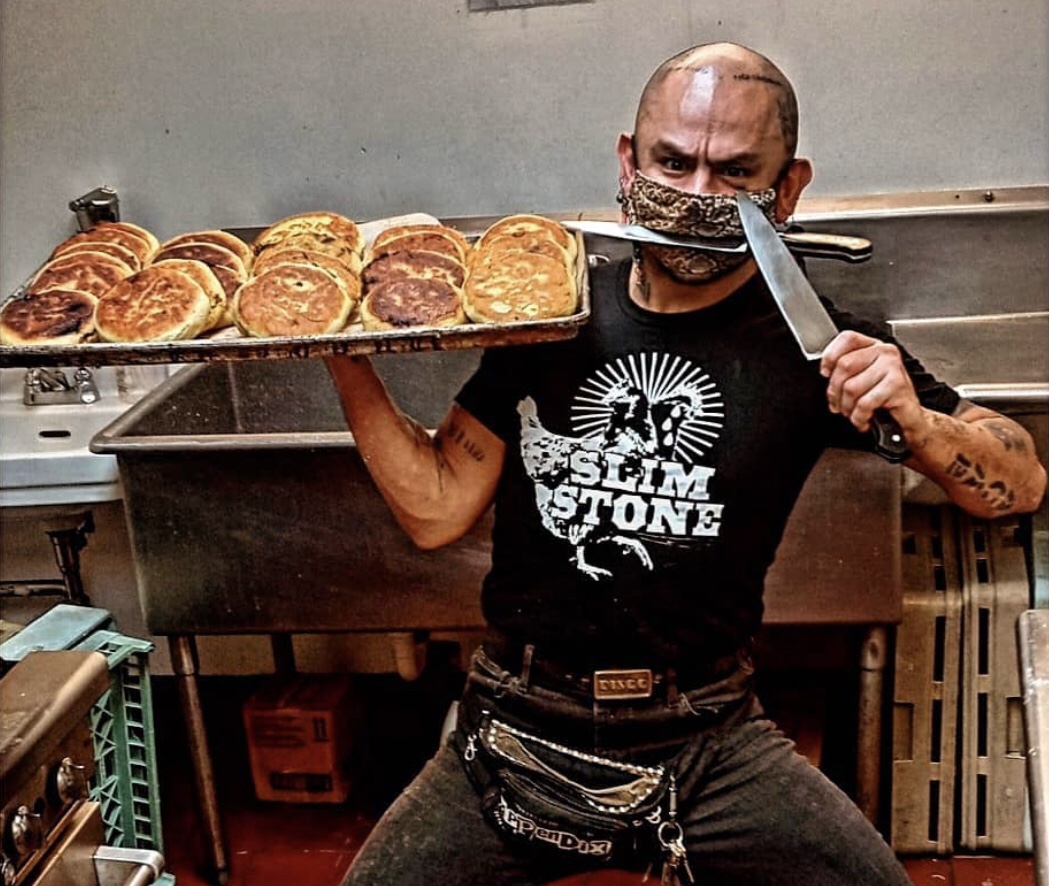Like so many of our favorite Instagram-based pop-ups and takeout/delivery spots, Masa Discos got its start in the chaotic early days of the pandemic. A few days after returning to Minneapolis from a week in L.A., chef Hector learned they’d been jettisoned from their job due to COVID-19 cuts.
After a small amount of panicked planning—they initially bought a rake and a tarp and started clearing peoples’ yards—Hector thought back to that trip to L.A., when they saw a line of Latin American people cooking food in a makeshift setup that included overturned shopping carts.
“I thought to myself, some people would see this and be like, repulsed. I see this, and I see people fucking getting it. Doing whatever it takes to make ends meet,” Hector says. Not long after, the idea for Masa Discos was born. “One of the things people know me for is that I make good food, and I’m a little bit entertaining.”
Case in point:
They didn’t start with pupusas in early 2020, but with “masa cakes,” which were cooked on the griddle and delivered to people throughout the Twin Cities. They took a small step back from Masa Discos after the murder of George Floyd to focus on feeding folks through F12 People’s Kitchen, but eventually found a way to do the two in tandem.
“I have a lot of energy, and I have a lot of initiative,” Hector says. “I don’t like to rely on other people to do shit for me.”
Masa Discos takes its name, of course, from masa—masa harina—the dried corn flour that is the basis of tortillas, tamales, pupusas, and so many other iconic Latin American dishes. But Hector has a knack for exploring its nearly boundless possibilities.
“In a nutshell—in a ‘pusa shell—I like to do international confluences of the El Salvadoran national dish, the staple food, la pupusa. But I get tired of crispy pork and beans and cheese,” Hector says. So, “in the most ethical, non-co-opty way,” Masa Discos brings other cultural traditions together with the pupusa.
“I’ve made dumplings, I’ve made pastas, I’ve made breads, I’ve made cakes—and I mean, cakes in the sense of a seafood cake, a corn cake,” Hector says. They’ve made gnocchi and schupfnudel, tortas and “masa ball soup.”
And, yes, lots and lots of pupusas—which, in keeping with everything Masa Discos does, are some of the most fun and inventive in town. Among the menu staples is the Queer’tido—a play on the fermented Salvadoran cabbage slaw, “curtido.”
“It’s a super-hot, tropical country, and people need to get inventive on ways to preserve food and preserve freshness,” Hector says. In the states, you’ll typically find curtido made with white vinegar or apple cider vinegar. The Masa Discos Queer’tido is more traditional, made with pineapple vinegar just like as it would be in El Salvador, and you’ll often find it accompanying roasted root veggies or turkey or barbacoa.
“I make my own pineapple vinegar, and I often include things like Thai chiles, jicama, a variety of other botanicals, and just… stuff,” Hector explains. “That’s why it’s Queer’tido, ‘cause of the pineapple vinegar. It’s fruity, you know what I’m saying? It’s the queer, inner-city person’s curtido, and it’s fruity, and it’s fucking beautiful.”
You’ll find Masa Discos at pop-ups and markets around town, especially as the warm weather hits and the market season gets into full swing. They’ve done collaborations with other independent food businesses like Bagel Taïm, and during Art-A-Whirl this weekend, Masa Discos will be serving food at a Craft & Creators market at Twin Spirits Distillery (1-8 p.m. Saturday).
Following along on Instagram is the best way to stay updated on the masa of the week, whether it’s a schupfnudeln or a pupusa. (Masa Discos often sells out, so you have to order quickly.) It’s also just the best way to see Hector in action, because part of the fun is watching the Masa Discos mastermind be their authentic, wild self in the kitchen.
One day the self-proclaimed “Pusa Queen of Minneapolis” is dancing and slapping a slab of bacon in a post captioned “Here's me chopping up pigs for teachers fighting for the right to bring home better bacon,” the next they’re dancing and prepping pupusas by the grill. (There’s a lot of dancing.) A clip of Hector slicing cukes is soundtracked by the Swedish hardcore band Mob 47; another, in which they’re cracking eggs for brownie batter, is soundtracked by the ’80s Italian disco group Fun Fun.
It’s a celebration of Black and Brown joy, of queerness—and of the humble masa harina, which is a staple in so much of the world’s pantries.
“What I really like to do is expose the versatility of masa harina to people who, their one conception of 'what is masa harina?' is gorditas, tacos, pupusas,” Hector says. “It is those things, but with a little creativity and a little fuckin’ elbow grease, masa can be anything you want.”






